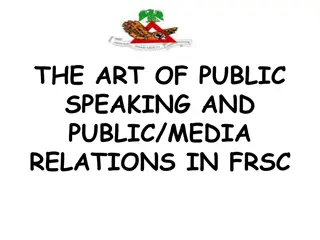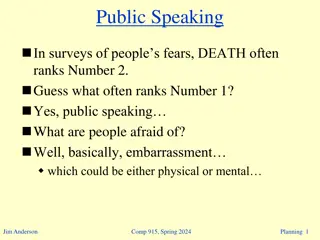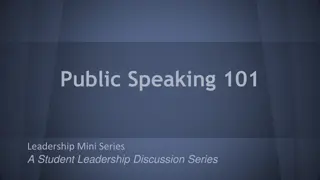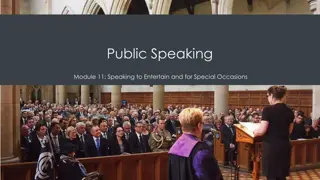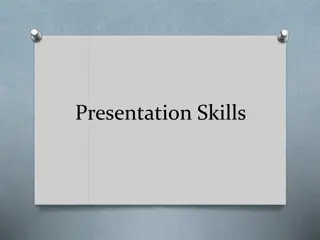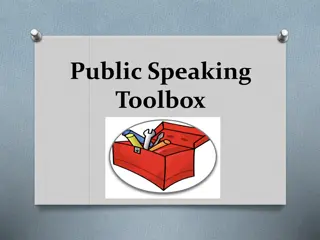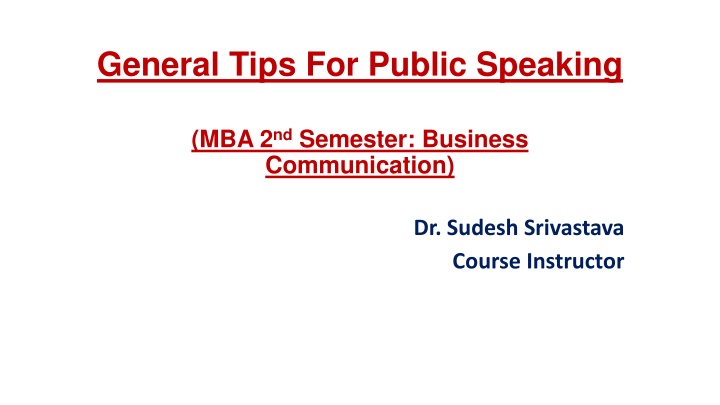
Effective Tips for Successful Public Speaking in Business Communication
Enhance your public speaking skills with these valuable tips from Dr. Sudesh Srivastava's Business Communication course. Learn the importance of observation, non-verbal cues, understanding your audience, developing your own style, choosing relevant topics, overcoming fear and anxiety, mastering language proficiency, and incorporating humor and anecdotes in your speeches for engaging presentations.
Download Presentation

Please find below an Image/Link to download the presentation.
The content on the website is provided AS IS for your information and personal use only. It may not be sold, licensed, or shared on other websites without obtaining consent from the author. If you encounter any issues during the download, it is possible that the publisher has removed the file from their server.
You are allowed to download the files provided on this website for personal or commercial use, subject to the condition that they are used lawfully. All files are the property of their respective owners.
The content on the website is provided AS IS for your information and personal use only. It may not be sold, licensed, or shared on other websites without obtaining consent from the author.
E N D
Presentation Transcript
General Tips For Public Speaking (MBA 2ndSemester: Business Communication) Dr. Sudesh Srivastava Course Instructor
1. Observation: One can learn a lot from simply observing people and things around us. Keen observation is a kind of attentive listening and taking mental notes. (For effective listening refer to our discussions in class).
2. Non-verbal cues An effective speaker is always a keen student of non- verbal (Kinesics, proxemics, haptics, occulesics, chronemics, para language etc. Please refer to cases and discussions.).
3. Feed-forward: Knowing you audience in advance is always beneficial. It helps in preparing yourself mentally and in terms of contents as well.
4. Avoid copying One should develop one s own style. The idea is to be yourself. One may be influenced by some other speaker/orator. But to emulate someone else leads us to be unnatural. Hence copying the style should be avoided.
5. Choose your topic/s One will be more comfortable in speaking about a subject/topic that is close to one s heart and one is knowledgeable about. Hence choose a topic that you know about.
6. Overcome fear and anxiety Fear and anxiety are common to our lives. However, in public speaking, one must learn to overcome both. Fear is defined as a natural physical reaction to imminent and known danger. On the other hand, anxiety is often vague.
7. Language An effective speaker must have an adequate command over the language/s. The speech must be delivered in a language that is easily comprehendible by the audience.
8. Humour, Idioms, anecdotes Wherever possible, use humour. Humour is usually a sure way of gaining interest as well as keeping them engaged. Using stories, short cases, anecdotes related to the topic make it interesting.
9. Improvise Observe the audience. Look for some obvious feedback. Whenever needed, be prepared to improvise. Have a plan B ready.
10. Work on your appearance We are responsible for the way we appear. First impression may not be (and should not be) the last impression. But it definitely is an important impression.
11. Rehearse and prepare Write your own script. If there is a time limit, you must rehearse to see if you are able to finish in time.
12. Its okay if you feel nervous Nervousness is natural. Don t let it choke you. No one is a perfect speaker. Remember the Gandhi story and the Amitabh Bachchan interview that we discussed.
An Exercise So, let us ponder over these points and work towards our first role play. The topic (common for all groups): A foreigner friend has come to visit your city and you are taking him/her around.




